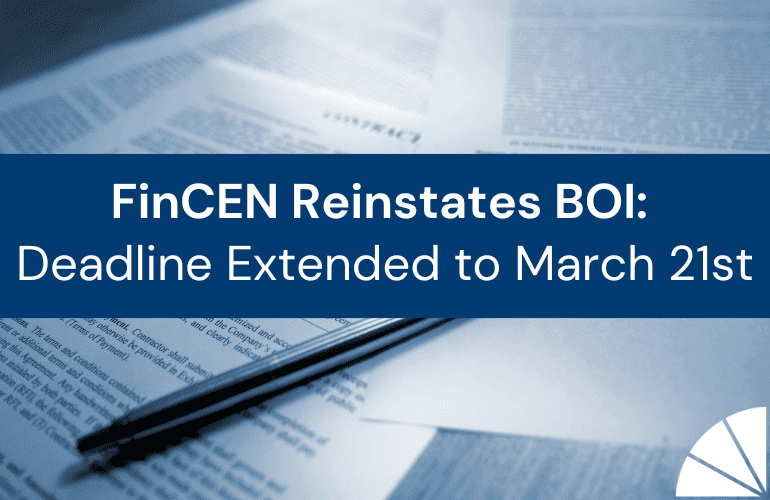
At LGA, we’ve been talking to our clients lately about what the firm’s membership in the Russell Bedford International (RBI) Network means for them. Because we now have instant access to valuable resources and connections across the globe, we can provide trusted cross border accounting, business advisory and tax services that focus on everything from big-picture regulations to local customs and culture. But, as they say, actions are louder than words. While we’re excited for clients to hear about these perks, what we really want is for them to see the benefits of our RBI membership first-hand.
We recently attended the 2021 RBI International Tax Conference, where we participated in engaging, interactive panel discussions led by tax experts from around the world. As a firm, we make it a priority to use our RBI resources to provide clients with actionable insights. That’s why we want to share hot topics and highlights from the 2021 RBI International Tax Conference.
The IRS has made compliance with international financial reporting requirements a key enforcement priority for 2021.
Individuals, partnerships, limited liability companies, corporations, and trusts and estates must report interests in or authority over foreign financial accounts, such as bank and brokerage accounts and mutual funds, if the aggregate value of those foreign financial accounts exceeds $10,000 at any time during the year. Foreign Bank Account Reporting (FBAR) is filed through the Financial Crimes Enforcement Network (FinCEN) using an electronic form, FinCEN Form 114.
The IRS oversees the enforcement of FBAR reporting. Penalties are assessed based on whether the IRS determines the violation is “non-willful” or “willful.” The penalty for non-willful violations can range anywhere from a warning letter to a $12,921 fee. A willful violation can result in a penalty of $129,210, or 50% of the maximum account value. And, if the violation spans several years, those penalties can be assessed per year of violation.
The Foreign Account Tax Compliance Act (FATCA) requires certain US taxpayers holding financial assets outside the country to report those assets to the IRS. For example, if a taxpayer filing as single (or married, filing separately) ends a tax year with specified foreign financial assets valued at more than $50,000, the taxpayer would have to report those assets to the IRS on Form 8938, Statement of Specified Foreign Financial Assets. The threshold would increase to $100,000 if the taxpayer filed as married, filing jointly. If the same taxpayer held assets valued at less than 50,000 at the end of the year, but those assets had reached a value of more than $75,000 at any point earlier in the year, the individual would still be obligated to file Form 8938. If the taxpayer lived abroad, the threshold would increase to $200,000 ($400,000 if married, filing jointly).
Officers, directors, or shareholders in certain foreign corporations may also need to file Form 5471, Information Return of U.S. Persons With Respect To Certain Foreign Corporations. The penalties associated with noncompliance can be severe, as they can be assessed for violations on the form itself or related schedules and forms that are required with your 5471 filing. They multiply quickly when not resolved. For example, if a foreign corporation fails to timely report foreign transactions on Schedule M, they could receive a $10,000 penalty. And, if the corporation receives notification concerning the failure to report from the IRS and is not timely in correcting the matter, they could receive up to $50,000 in additional penalties for the same violation. The same is true for a US shareholder who fails to disclose reportable transactions on Form 8886, Reportable Transaction Disclosure Statement. But in this case, a separate $10,000 penalty may be assessed for each missed reportable transaction.
While foreign reporting is at the forefront of the IRS’s agenda, unfortunately, that doesn’t mean they are making taxpayer compliance any easier.
There are several gray areas in foreign financial reporting. The AICPA has requested formal guidance from the IRS on several tax matters relating to controlled foreign corporations (CFCs), passive foreign investment companies (PFICs), and individuals. Among others, these matters relate to clarifications on foreign tax credits (FTCs), foreign gifts, foreign trusts, and specific reporting requirements for FinCEN Form 114, Form 8938, and Form 5471.
The IRS provides optional programs, such as Delinquent FBAR Submission Procedures and Streamlined Filing Compliance Procedures, for taxpayers to participate in to resolve FBAR noncompliance. In the past, the IRS’s incentives for taxpayers to participate in voluntary disclosure were more encouraging. However, a shift in the compliance landscape has made it more challenging for those with delinquent FBARs to come forward. The AICPA is among those mobilizing lobbying efforts to quell that movement.
Digitization, virtualization, and automation are all changing the landscape ahead for international coordination on tax reporting enforcement.
In today’s digitized economy, a multinational company can earn income in a jurisdiction where they are not physically located. The Organisation for Economic Co-operation and Development (OECD), European Union (EU), and G20 are conducting meetings to discuss how to appropriately tax that income and other tax challenges arising as the digitization of the economy continues. In October 2020, they released two pillars on base erosion and profit shifting (BEPS 2.0). By June 2021, 130 countries had signed on to the OECD’s two-pillar global minimum tax plan, which proposes a minimum tax rate of at least 15%. The Republic of Ireland was a notable exception to those joining the agreement, as their tax rate is the lowest in Europe and, at 12.5%, comes in below the proposed minimum.
Pillar 1 would allocate a portion of the residual profits of certain multinational corporations to market jurisdictions on the basis of revenue earned there. Pillar 2 would create a global minimum tax. The US aims to reform global intangible low-taxed income (GILTI) in favor of an income inclusion rule (IIR) similar to rules for US CFCs. The US has also pledged to replace the base erosion and anti-abuse tax (BEAT) with an undertaxed payments rule (UTPR). As the landscape changes, multinational companies need to know about developments related to scale thresholds and how the nexus and revenue sourcing rules will apply.
Trading in virtual currencies has become an increasingly commonplace practice. However, like the other areas in foreign reporting mentioned above, guidance is not clear. The AICPA has also requested formal guidance on the tax treatment of cryptocurrency from the IRS. For example, some taxpayers may not be aware that the value created by converting cryptocurrency into fiat currency or transferring it from a virtual currency wallet to exchange counts toward the aggregate thresholds for FBAR and FATCA reporting.
There are AI developments on the horizon that could help professional services firms build legal intelligence and analyze the effects of tax laws. Programs are currently in development that could assist CPAs and lawyers with research, finding case log, and forming opinions on legal and tax matters.
Brexit: Since the UK broke away from the euro system, companies trading with the UK have experienced added costs.
The Republic of Ireland is on the euro system. Because it is a part of the United Kingdom, Northern Ireland’s official currency is the pound sterling. When selling into the UK, companies dealing with VAT are encountering extra administrative work, longer turnaround time for goods, and delayed or canceled exports due to the challenges of the new border requirements and issues with control post operations.
The European Union’s food safety rules don’t allow chilled meat products to enter its market from non-members like the UK. Over the 6-month grace period in place since January 2021, talk of possible meat bans, legal action, and tariffs on British goods erupted into what has now been coined the “Sausage War.” However, on June 30th, the last day of the grace period, the European Union agreed to extend the grace period another three months.
But the overall business outlook isn’t bad for companies looking to trade in the UK. According to RBI, “The UK regulatory and political environments remain stable and efficient (the World Bank estimates that it takes 13 days to set up a business in the UK compared with an average of 32 days in the rest of Europe). What’s more, the UK’s corporation tax rate of 19% is one of the lowest in Europe, bettered only by the Republic of Ireland at 12.5 %, and Hungary at 9%. Although a difficult journey, the UK’s trade deal with the EU offers its international partners (with few exceptions) unlimited tariff-free access to European markets. Keen to establish its own post-Brexit place in the world, this deal is likely to be one of many free-trade treaties that the UK will complete in 2021.”
Contact LGA
Because of our RBI membership, LGA’s International Tax Services Team has the resources to address a wide variety of international business and individual tax needs. If you have questions about any of our insights from the 2021 RBI International Tax Conference, contact Larry Andler or Steve Gallant today.







